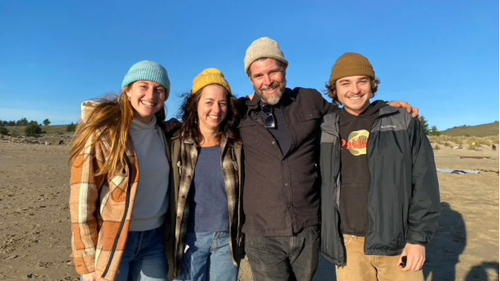A historian from Yekaterinburg is likely behind the pseudonym “Anna Korobkova,” a name used to file hundreds of reports to the Russian authorities denouncing people for supposedly anti-government views. Former college lecturer Ivan Abaturov has allegedly spent years informing the police about “opposition” activity, according to a new investigation by the BBC’s Russian-language service. Meduza summarizes the report’s findings, which rely largely on independent research by anthropologist Alexandra Arkhipova.
Alexandra Arkhipova, an anthropologist targeted by “Korobkova” two years ago, discovered evidence linking Abaturov to the denunciations. In the fall of 2022, the name “Anna Korobkova” was signed on a letter submitted to Arkhipova’s employer at the time, the Russian Presidential Academy of National Economy and Public Administration, demanding that she be fired for “immoral acts” during an interview with the opposition network TV Rain. According to “Korobkova,” Arkhipova’s remarks “discredited” Russia’s “special operation” in Ukraine.
In February 2023, Arkhipova began compiling a database of Korobkova-signed denunciations to determine whether they were the work of a single person or multiple individuals (such as a Russian police agency). She also gathered Korobkova-signed letters to journalists and began corresponding directly with the person(s) claiming the identity.
By late 2024, Arkhipova had collected 74 messages signed by “Korobkova,” including denunciations against teachers, academics, professors, human rights activists, doctors, and lawyers. Threatening Korobkova-signed letters also reached individuals who had given comments to “foreign agent” media outlets, urging them to pledge not to repeat the infraction. “Korobkova” bragged to the BBC about writing 1,357 denunciations between February and September 2023 alone and filing them with agencies like the Prosecutor General’s Office, the Federal Security Service, the Federal Penitentiary Service, the Justice Ministry, and others. In correspondence with Arkhipova, “Korobkova” claimed to have sent 764 such reports to the Russian authorities during the first year of the full-scale invasion of Ukraine.
Arkhipova also discovered a Russian-language Wikipedia page about Korobkova, citing multiple copies of responses from Russian government agencies to Korobkova-signed denunciations. In other words, as Arkhipova noted, the Wikipedia page’s editor had access to the official replies to the Korobkova-signed reports. Collaborating with linguist Daniil Skorkin, Arkhipova compared the Wikipedia article with the Korobkova-signed letters sent to her and several journalists. Using stylometric analysis (a method based on the frequency of certain function words), they found a strong similarity between the Wikipedia article and the Korobkova-signed letters.
The Wikipedia article’s edit history shows it was written by a user named “Arkadiy2023.” This same user uploaded photos to Wikimedia Commons, primarily of events in Yekaterinburg, often held at the Yeltsin Center, taken with a Panasonic DMC-FT4 camera. Before “Arkadiy2023” appeared on Wikipedia in April 2023, only one user in Russia — nicknamed “Ivan Abaturov” — had used this exact camera model.
Arkhipova and Skorkin gathered texts written by Abaturov, including his posts on Wikinews, descriptions of Wikipedia edits, social media posts, and comments on various platforms. They compared these to the Korobkova-signed denunciations and letters and reached the following conclusion, according to the BBC:
The structure and thematic segments of texts by “Korobkova” and Abaturov were identical, although the order sometimes varied. Denunciations by other authors, also analyzed by Arkhipova and Skorkin, were structured differently. Specific phrases frequently found in Korobkova-signed denunciations, such as “I (categorically) oppose any/all [X],” were also regularly used by Abaturov. […] Furthermore, both Abaturov and “Korobkova” shared unique lexical and grammatical features and made similar errors. For example, they both used a dash instead of the grammatically correct commas when writing mol [“so they say”] to convey indirect speech.
Additionally, “Korobkova” often began sentences with complex conjunctions like prichem (“moreover”), pri etom (“at the same time”), and to est’ (“that is”). Arkhipova found hundreds of similar examples in Abaturov’s texts. Both frequently used expressions like “this person” or “the given individual” and repeatedly wrote the relative pronoun “which” within a single sentence referring to different objects.
Arkhipova also analyzed the autobiographical information revealed in the Korobkova-signed correspondence with her and numerous journalists, finding that some of the data matched what is known about Abaturov from public sources. For example, both were born in 1985, received a humanities education, and worked in teaching. Also, both of their grandfathers had special roles in World War II. In the Korobkova-signed letters, the author attributed their knack for denouncing anti-state behavior to their grandfather, who himself was an NKVD informant during Stalin’s time.
BBC journalists learned that “Korobkova” and Abaturov shared the same IP address for filing complaints and denunciations — an IP address registered to the Yekaterinburg Internet provider Insis.
According to the investigation, Ivan Abaturov graduated in 2008 with a master’s degree in history from Ural State University, where his academic advisor was Alexey Mosin, a historian who headed the Ural branch of the human rights organization Memorial. Mosin described Abaturov’s reputation among colleagues as ranging “from cautious to hostile.” He noted that Abaturov once threatened a professor, accusing her of giving him unfairly low grades. Mosin also told the BBC about an incident where Abaturov’s grandmother came to the university to demand an explanation for why her grandson was given a “B” instead of an “A.”
In 2013, a local court fined Abaturov 5,000 rubles (about $160 at the time) for assault after he allegedly started a fight with a student at the Yekaterinburg Technical College, where he was lecturing at the time. Abaturov denied the charges but claimed that students often pelted him with objects like tin cans, chalk, and pine nuts.
Journalists learned that Abaturov began filing complaints with the authorities in the late 2010s and uploading scans of the government’s responses to Wikimedia Commons. Around the same time, he started regularly attending public events in Yekaterinburg, including talks hosted at the Yeltsin Center and monthly demonstrations supporting political prisoners. Abaturov introduced himself as a journalist and wrote about the events for Wikinews.
According to the BBC, Abaturov later began writing denunciations under his own name against public figures. For example, in January 2020, scientist and human rights activist Sergei Zykov learned that Abaturov had filed a police report against him. The name “Anna Korobkova” didn’t gain notoriety as a serial snitch until 2022. A source told the BBC that some public figures in Yekaterinburg began to suspect Korobkova was Abaturov’s pseudonym, given the familiar style of the Korobkova-signed denunciations.
“He's a historian, and he knows judicial statistics well — better than all lawyers. He supported the war when it started. In private conversations, he’s said denunciations are good. The word donos [‘denunciation’] has a positive connotation for him. He explained that denunciations are a means for civil society to interact with the state,” one public figure in Yekaterinburg who knew Abaturov told the BBC.
At the same time, Alexey Mosin says he’s not ready to believe that his former student is responsible for the letters signed with Korobkova’s name, which include several threatening messages addressed to him personally. “I watched him grow as a student. He was a boy with peculiarities (to put it gently), but I still have a special place in my heart for him. You know, you can’t help but feel a special way about your own students. I just can't believe he's capable of this. To behave like this... I still believe he respects me as a teacher,” Mosin told the BBC.
In messages on VKontakte, the BBC asked Abaturov if he uses the pseudonym “Anna Korobkova” to write reports against anti-government-minded compatriots. “Greetings. You are mistaken,” he answered. A reporter for the Yekaterinburg-based outlet It's My City reached Abaturov by phone, but he refused to answer the journalist's questions, citing a court order to revoke the publication’s media license and block its website.
After the BBC published its investigation on Thursday, Wikipedia permanently blocked Ivan Abaturov's user profile.






